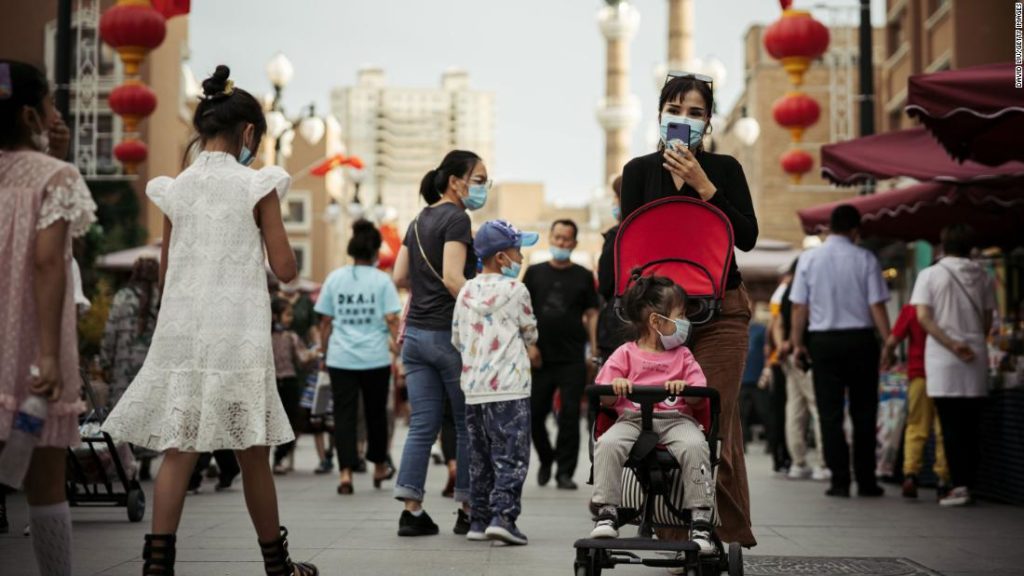The answer might lie in Beijing’s attitudes towards its ethnic minorities, particularly those in Xinjiang.
The Chinese government strongly denies allegations of genocide and says that any attempts to limit the Uyghur population fall within the country’s standard birth control policies.
Experts said Beijing is reluctant to remove all quotas on the number of children per family for several reasons. But one major factor is that ending the policy would make it much more difficult to justify Beijing’s attempts to limit the population in Xinjiang and other regions with large minority groups, which tend to have more children.
“Continuing to limit births among populations deemed problematic is certainly part of the calculus,” said Darren Byler, a Xinjiang expert and a postdoctoral research fellow at the University of Colorado.
“If there was no policy across the whole country, it would be difficult to enforce a separate one for poor people and Muslims.”
Bucking the trend
China’s birth rate has been falling rapidly since the introduction of the one-child policy more than 40 years ago, which limited couples to one baby in order to alleviate poverty and stem a population boom.
While the policy successfully reined in birth rates as China developed, in more recent years officials have become concerned the country won’t have enough young workers to keep powering its economic growth. A rapidly aging workforce, expecting their promised pensions, has only exacerbated those pressures.
Some Uyghurs exceeded this and in many cases that was tolerated.
Sudden drop
But when the Chinese government began its crackdown in Xinjiang in 2017, which allegedly involved sending millions of Uyghurs to a vast complex of detention centers, there was a simultaneous tightening of family planning policies.
Between 2017 and 2018, birth rates in Xinjiang dropped by a third, from 15.8 per 1,000 people to 10.7 per 1,000 people.
At a time when the Chinese government was desperately trying to raise birth rates, sterilizations in the region surged to 243 per 100,000 people in 2018, according to official government documents referenced in a report by Xinjiang researcher Adrian Zenz. That is far higher than the rate of 33 per 100,000 people for the rest of the country.
And while the use of IUD birth control devices dropped in China between 2016 and 2018, Zenz quoted documents showing in Xinjiang it rose to 963 per 100,000 people.
Female Uyghurs who have since left Xinjiang say they were subjected to forced contraception and sterilizations.
In his report, Zenz quoted official Chinese government policy directives beginning in 2017 which call on administrators to “severely attack behaviors that violate family planning (policies).” From that year, minority regions began a “special campaign to control birth control violations.”
The Chinese government did not mention minorities, including Uyghurs, in its relaxing of the three-child policy, and authorities have consistently denied accusations of forced contraception and sterilization.
Experts said it is unlikely the rules will be relaxed for minorities any time soon.
“If you lifted the birth restrictions universally, they’d lose their justification for tightening birth control policies against specific sectors of Chinese society that they dislike,” said Carl Minzner, professor of law at Fordham University.
Jobs and surveillance
Retaining control over Xinjiang birth rates is not the only reason for the Chinese government’s retention of three-child limits on families.
Experts said Beijing would be reluctant to find new roles for the tens of thousands of people employed by the government to oversee the country’s massive family planning policy.
At the same time, removing the limits would abolish one of the many ways in the Chinese government can monitor its population, Byler said, forcing Beijing to find another reason to carry out intimate domestic surveillance.
There might also be a very practical reason why the Chinese government has kept its family planning policy regime in place, even if it has loosened it slightly.
Beijing might need tighten the rules again in the future.
You may also like
-
Afghanistan: Civilian casualties hit record high amid US withdrawal, UN says
-
How Taiwan is trying to defend against a cyber ‘World War III’
-
Pandemic travel news this week: Quarantine escapes and airplane disguises
-
Why would anyone trust Brexit Britain again?
-
Black fungus: A second crisis is killing survivors of India’s worst Covid wave

